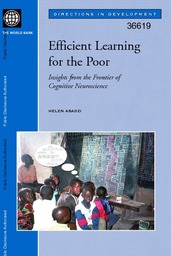
ATTENTION: The works hosted here are being migrated to a new repository that will consolidate resources, improve discoverability, and better show UTA's research impact on the global community. We will update authors as the migration progresses. Please see MavMatrix for more information.
Show simple item record
| dc.contributor.author | Abadzi, Helen | |
| dc.date.accessioned | 2014-07-01T21:52:26Z | |
| dc.date.available | 2014-07-01T21:52:26Z | |
| dc.date.issued | 2006 | |
| dc.identifier.isbn | e-ISBN: 0-8213-6689-0 | |
| dc.identifier.uri | http://hdl.handle.net/10106/24329 | |
| dc.description.abstract | This book integrates research into applications that extend from preschool brain development to the memory of adult educators. In layman's terms, it provides explanations and answers to questions such as: Why do children have to read fast before they can understand what they read? How do health, nutrition, and stimulation influence brain development? Why should students learn basic skills in their maternal language? Is there such a thing as an untrained teacher? What signs in a classroom show whether students are getting a quality education? How must information be presented in class so that students can retain it and use it? What training techniques are most likely to help staff put their learning into use? This book is intended for use by policymakers, donor agency staff, teacher trainers, supervisors, and inspectors, as well as university professors and students. | en_US |
| dc.language.iso | en_US | en_US |
| dc.publisher | The International Bank for Reconstruction and Development/World Bank | en_US |
| dc.relation.ispartofseries | Directions in Development 36619 | |
| dc.rights | CC BY 3.0 IGO | |
| dc.subject | Literacy | en_US |
| dc.subject | Cognitive sciences | en_US |
| dc.subject | Educational research | en_US |
| dc.title | Efficient Learning for the Poor : Insights from the Frontier of Cognitive Neuroscience | en_US |
| dc.type | Book | en_US |
| dc.publisher.department | Department of Curriculum and Instruction, The University of Texas at Arlington | en_US |
| dc.description.pagination | i-xiv; 1-286 | |
| dc.identifier.doi | DOI: 10.1596/978-0-8213-6688-2 | |
Files in this item
- Name:
- 366190Efficien101OFFICIAL0USE0 ...
- Size:
- 2.679Mb
- Format:
- PDF
- Description:
- pdf
This item appears in the following Collection(s)
Show simple item record


